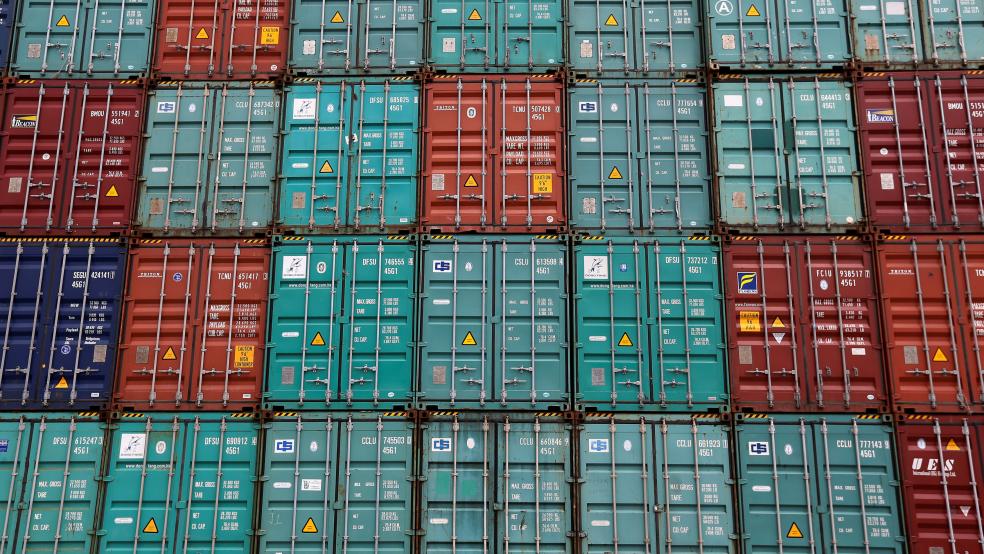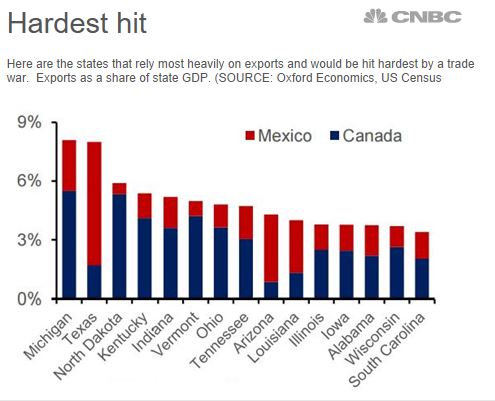President Donald Trump arrives for a meeting with business leaders in the Roosevelt Room of the White House in Washington January 23, 2017. Trump: We will impose major border tax if companies go overseas
President Donald Trump wasted no time Monday moving ahead on his campaign promise to renegotiate a nearly quarter-century-old free trade agreement with Canada and Mexico — a move that could end up hurting workers in the states that heavily supported him.
Related: Was NAFTA Really So Bad for the Economy?
Trump is expected to sign an executive order as early as Monday stating his intention to renegotiate the North American Free Trade Agreement with Canada and Mexico, a White House official told NBC News.
Initiated by former President George H.W. Bush and signed into by former President Bill Clinton in 1994, NAFTA has helped boost U.S. exports to Canada and Mexico, the nation's two largest trading partners.
Trump, who blamed the deal for destroying American jobs, called it "one of the worst deals ever" during an October debate with Hillary Clinton.
But many analysts caution that placing tighter restrictions on trade with Canada and Mexico could leave even more workers out of a job.
"A renegotiation of the North American Free Trade Agreement could adversely impact Midwestern manufacturing states who swung for Trump in 2016," according to Gregory Daco, an economist at Oxford Economics.
Related: GOP Governors Voice Alarm About Losing Expanded Medicaid
Among the states whose economies rely most heavily on trade with Canada and Mexico, the top five — Michigan, Texas, North Dakota, Kentucky and Indiana — all went for Trump in the November election.
"If Trump renegotiates NAFTA, as he has said he would, activity in these states would likely come under pressure," said Daco.
Other states that would feel the impact of an export slowdown include Southern states like South Carolina and Alabama that have seen a resurgence in manufacturing investment in recent years.
Several automakers have already been the target of Trump's trade ire for plans to increase production in Mexico.
But withdrawing from NAFTA would cost the U.S. auto manufacturing an estimated 31,000 jobs, according to the Center for Automotive Research.
The White House official also told NBC News that Trump is also expected to sign an executive order announcing plans to pull out of the Trans-Pacific Partnership, a trade agreement among 12 Pacific rim countries negotiated by the Obama administration but not ratified by Congress.
Restricting trade with those countries would hit West Coast states the hardest because they rely most heavily on trade with Asia.
It remains to be seen whether the Trump administration can negotiate more favorable terms with trade partners without slowing the cross-border flow of goods and services.
"It is possible that those two countries [Canada and Mexico] will offer concessions, not unlike Japan's pragmatic response to the U.S. protectionist push in the 1980s," said Paul Ashworth, chief U.S. economist at Capital Economics. "But if not, protectionism could trigger a stronger dollar, retaliation from other countries and higher domestic inflation."
Congressional Republicans have also proposed an overhaul of the tax code that would penalize companies by taxing the goods and raw materials they import while exempting them from taxes on revenues from exports.
The so-called border tax adjustment is intended to encourage U.S. companies to source their goods from American suppliers.
But it's not clear whether the Trump administration supports the idea. In an interview with The Wall Street Journal last week, Trump criticized the plan as "too complicated."
This article originally appeared on CNBC. Read more from CNBC
China: We can lead world beyond 'crisis' of Western democracy and capitalism
Pope Warns That Rising Populism Could Produce a New Hitler
Here’s what will drive the markets most as Trump’s term begins




